With the ultimate to promote cancer immunotherapies and precision medicine, Creative Biolabs is working on a variety of Next-IO™ programs. We have been in business for over a decade and our extensive CRO experiences in antibody discovery, engineering and manufacture can help us achieve significant success with our partners together. This program aims to develop monoclonal therapeutic antibody (mAb) targeting CD24 that known to introduce a novel “don’t eat me” signal in the cancer progression system.
CD24
CD24, known as a heat-stable antigen or small-cell lung carcinoma cluster 4 antigen, can mediate inflammatory responses through interacting with sialic-acid-binding Ig-like lectin 10 (Siglec-10) that is expressed on innate immune cells. When binding, CD24 induces inhibitory cascade that suppresses the immune responses via SHP-1 and SHP-2, two Src homology region 2 domain-containing phosphatases. The cytoplasmic tail of Siglec-10 contains two immunoreceptor tyrosine-based inhibition motifs which facilitate the binding. CD24-Singlex-10 interactions can block toll-like receptor-mediated immunity and hinder cytoskeletal rearrangement, which are essentials for phagocytic clearance.
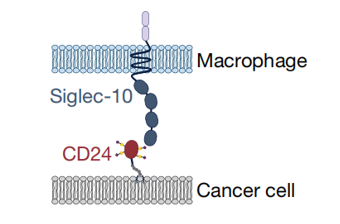 Fig.1 Schematic-depicting interactions between macrophage expressed Siglec-10 and CD24 as it is found in cancer cells. (Barkal, 2019)
Fig.1 Schematic-depicting interactions between macrophage expressed Siglec-10 and CD24 as it is found in cancer cells. (Barkal, 2019)
Our Anti-CD24 Monoclonal Antibody Program
Studies have shown that CD24 is expressed in some cancer types, and high expression contributes to poor prognosis. Recently, one groundbreaking discovery identified CD24, as a “don’t eat me” signal, can block the immune system and attack cancer cells.
-
CD24 can promote immune evasion through interaction with Siglec-10;
-
Siglec-10 is highly expressed on tumor-associated macrophages;
-
Blocking CD24-Siglec-10 interaction through genetic ablation or monoclonal antibodies can enhance the phagocytosis of CD24-expressing in human tumor cells;
-
Blocking CD24 may slow tumor growth and increased survival rate in vivo.
From the data, it reveals CD24 has therapeutic potential in cancer immunotherapy. Our program aims to discover and develop novel therapeutic monoclonal antibodies against CD24. Except for mAb therapy, we also interest in combination therapies or other antibody modalities. We are dedicated to developing valuable pipelines with our partners!
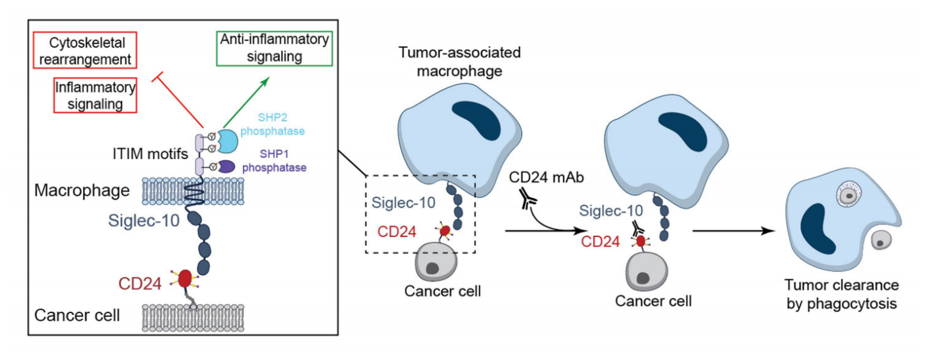 Fig.2 Anti-CD24 monoclonal antibodies promote phagocytic clearance of cancer cells over time. (Barkal, 2019)
Fig.2 Anti-CD24 monoclonal antibodies promote phagocytic clearance of cancer cells over time. (Barkal, 2019)
Published Data
Our program is developed using a basic principle that blocking CD24 can boost macrophage-dependent phagocytic clearance of CD24-expressed tumor cells. Here are some published data on CD24.
-
CD24 is over-expressed in ovarian cancer cells and breast cancer cells; Siglec-10 over-expression in tumor-associated macrophages are also elevated.
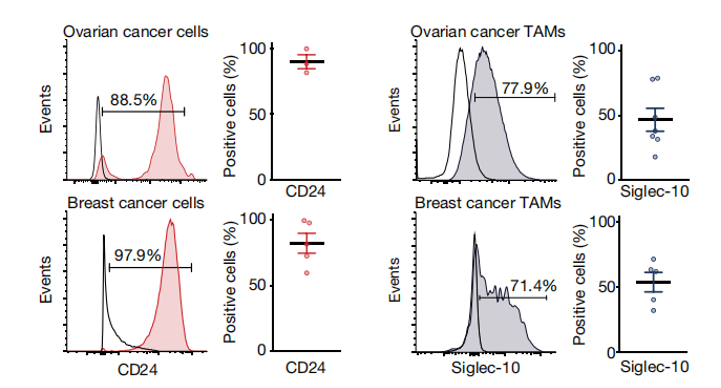 (Barkal, 2019)
(Barkal, 2019)
-
High expression of CD24 associates to poor prognosis in patients with ovarian and breast cancer.
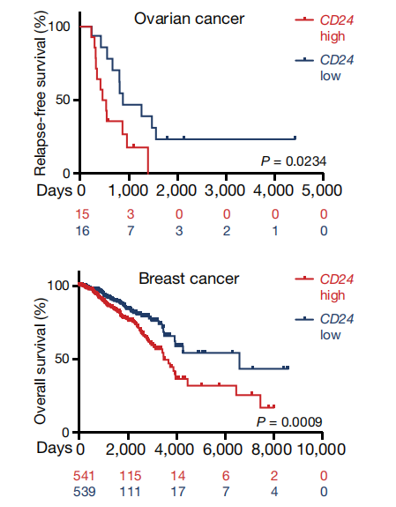 (Barkal, 2019)
(Barkal, 2019)
-
Treatment with anti-CD24 mAb promotes phagocytic clearance of human cancer cells.
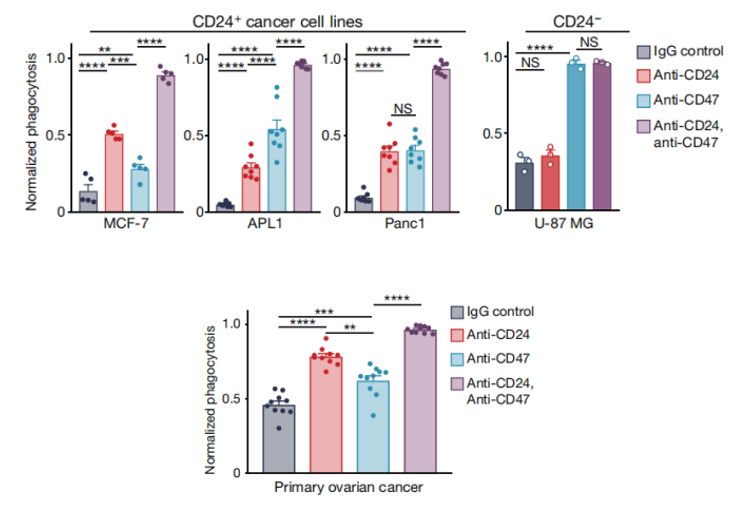 (Barkal, 2019)
(Barkal, 2019)
-
Treatments with anti-CD24 mAb or genetic ablation inhibit tumor growth and improve the survival rate.
 (Barkal, 2019)
(Barkal, 2019)
We have extensive experience in performing comprehensive program developments and effective problem-solving. For our Next-IO™ programs, we are committed to promoting the program to the pre-IND stage within about 1.5 years. The accurate timeline will be determined on a case-by-case basis. Here is a draft timeline for your glance.
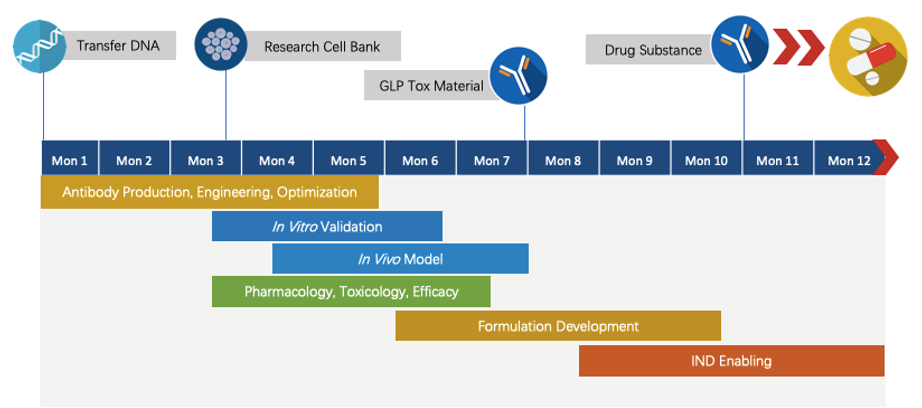
Creative Biolabs is seeking partners to co-develop the therapeutic monoclonal antibody targeting the novel “don’t eat me” signal - CD24. We are dedicated to providing our customers 24/7 high-standard customized service. Our goal is promoting the program to the pre-IND stage as soon as possible. If you are interested in our program, please feel free to contact us to learn more.



 Fig.1 Schematic-depicting interactions between macrophage expressed Siglec-10 and CD24 as it is found in cancer cells. (Barkal, 2019)
Fig.1 Schematic-depicting interactions between macrophage expressed Siglec-10 and CD24 as it is found in cancer cells. (Barkal, 2019)
 Fig.2 Anti-CD24 monoclonal antibodies promote phagocytic clearance of cancer cells over time. (Barkal, 2019)
Fig.2 Anti-CD24 monoclonal antibodies promote phagocytic clearance of cancer cells over time. (Barkal, 2019)
 (Barkal, 2019)
(Barkal, 2019)
 (Barkal, 2019)
(Barkal, 2019)
 (Barkal, 2019)
(Barkal, 2019)
 (Barkal, 2019)
(Barkal, 2019)



 Download our brochure
Download our brochure